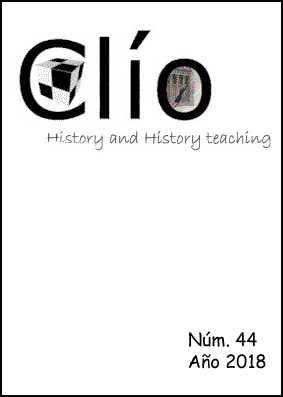Medieval history, philosophy and science (14th century) according The name of the rose, by Umberto Eco
DOI:
https://doi.org/10.26754/ojs_clio/clio.2018448687Keywords:
Spirituals, John XXII, Ludwig of Bavaria, Philosophy, History and Scientific KnowledgeAbstract
In the early fourteenth century, the confrontation between the "spiritual" Franciscans and Pope John XXII had arisen. The German Emperor Ludwig of Bavaria intervened in the confrontation in favor of the Franciscans and against the pope. In the novel The Name of the Rose by Umberto Eco, the conflict between the Franciscan William, who represents William of Ockham and the Dominican inquisitor Bernard Guí it is staged. In its pages the author cited the philosophy of Aristotle, Thomas Aquinas, Bonaventure of Bagnoregio, Marsilio of Padua and William of Ockham himself. Political philosophy and scientific knowledge of the time: Albert the Great and Roger Bacon and others complete the picture of that XIV century. This shows an unquestionable educational interest of Umberto Eco's book.
Downloads
References
Álvarez Palenzuela, V. A. (2003) “El Pontificado de Bonifacio VIII a Alejandro VI” en Mitre Fernández, E., Historia del cristianismo. Vol.2. Madrid: Editorial Trotta, pp. 521-574.
Aquino, T., y Alvernia, P. (2001). Comentario de la Política de Aristóteles. Pamplona: Editorial EUNSA.
Bertelloni, F. (2002) La Filosofía Medieval. Madrid: Editorial Trotta.
Boecio, A. M. (2008) Consolidación de la Filosofía. Madrid: Alianza editorial.
Bonin Aguiló, F.(1999) “Roger Bacon y la ciencia experimental” en Indagación: revista de historia y arte 4, pp. 27-42.
Delhaye, P. (1961) La filosofía cristiana medieval. Andorra: Editorial Casal i Vall.
Dupré, B. (2010). 50 cosas que hay que saber sobre filosofía. Barcelona: Editorial Ariel.
Ghisalberti, A. (1975). Giovanni Buridano dalla metafísica alla física. Milano: Università cattolica del Sacro Cuore.
Guerrero, R. R. (1999) “La alquimia árabe: ¿Transformación de la naturaleza del hombre?” en Veritas: revista Pontificia Universidade Catolica do Río Grande do Sul, vol. 44 (3) pp. 515-522.
Herde, P. (1987) “Celestino V e la spiritualità francescana” en Schede Medievali, 12-13, pp. 11-24.
Lindberg, D. C. (1980) Science in the Middle Ages. Chicago: University od Chicago.
López Gonzalez, R. (2009) “Paracelso: una de la raíces de la química” en Visión electrónica, 3, pp. 104-111.
Martínez Fresnada, F. y Merino Abad, J. A. (2002). Manual de Teología Franciscana. Madrid: Biblioteca de Autores Cristianos (BAC).
Mensa i Valls, J. (1998) Arnau de Vilanova. (c. 1240-1311). Madrid: Ediciones Orto.
Merino, J. A. (2003) Historia de la Filosofía Franciscana. Madrid: Biblioteca de Autores Cristianos. (BAC).
Micheli-Serra, A. (2002) “Notas sobre la medicina del antiguo Islam” en Gaceta Médica de México, 138 (3). pp. 281-286.
Padua, M., y Jandun, J. (1998). El Defensor Pacis (El Defensor de la Paz). Madrid: Editorial Técnos.
Rech, R. y Lamarrigue, A-M. “Bibliographie: I. (2002) Comptes rendus critiques: Bernard Gui (1262-1331): un historien et sa méthode” en Bibliothèque de l’Ecole des Charles, 160 (1), pp. 318-320.
Saba, A. (1964) Historia de los Papas (Desde San Pedro a Celestino V). Barcelona:Editorial Labor.
Sarrate García, C. (1993) El nominalismo en Buridán. Barcelona: Publicacions Universitat de Barcelona.
Downloads
Published
How to Cite
Issue
Section
License
Copyright (c) 2018 José C. Illana Rubio, Yolanda Illana Ruiz

This work is licensed under a Creative Commons Attribution-NonCommercial-ShareAlike 4.0 International License.
This work is licensed under a Creative Commons Attribution-NonCommercial-ShareAlike 4.0 International License.
Copyright remains the property of authors. Permission to reprint must be obtained from the authors and the contents of JoS cannot be copied for commercial purposes. JoS does, however, reserve the right to future reproduction of articles in hard copy, portable document format (.pdf), or HTML editions of JoS.






